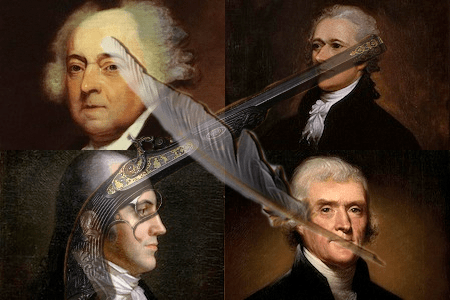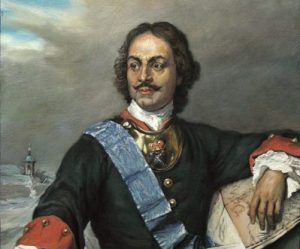After watching the current events of this 2016 election, the American people can agree as a whole that this Presidential race has been significantly different than ones we have seen before. The two candidates take and give personal blows to each other, and the electorate watches as what seems as the most personal election in recent history. With careful consideration of previous American Presidential Elections, one might be reminded of another election just as personal, maybe even more so, than our current one. The Election of 1800, or as Thomas Jefferson put it: the “Revolution of 1800.”1
This gruesome election was between Federalist and incumbent John Adams with his running mate Charles C. Pinckney and Democratic-Republican and principal author of the Declaration of Independence Thomas Jefferson with his running mate Aaron Burr. In this story we have an interesting cast of characters, all of which are very prominent figures in the history of the early Republic. The men involved had intricate personal relationships that acted as a catalyst in the crucible that would become the Election of 1800.
All men involved came from some form of political or military merit. John Adams was a prominent voice in declaring America’s Independence. Thomas Jefferson had been the United States Minister to France (he had spent a majority of the war and its aftermath in France). Aaron Burr had been a colonel in the Continental Army. Most of the men were quite fond of each other due to the fact that they had worked with each other before, although all had one thing in common: their distaste for Alexander Hamilton, Chief de Aide for General George Washington during the Revolutionary War and Senior Officer in the Continental Army. Hamilton was a stubborn man. Years before the election Hamilton had attempted to destroy Adams in his Adams’ Pamphlet, 2. He continuously bashed heads with Jefferson, while both he and Jefferson served in George Washington’s Presidential Cabinet in the early 1790s; and Hamilton was very vocal in his distaste of Aaron Burr.

At the beginning of the race, much of the American population was not too fond of President Adams’s Administration. With the implementation of the highly unpopular Alien and Sedition Acts, which was an act of law signed by Adams himself in 1798 that allowed the deportation of foreigners, the Federalist party itself seemed to fall apart. Only some truly supported Adams. With the relative unity of the Democratic-Republican Party and the particular favoritism of Jefferson in the South and Aaron Burr in New York, the Federalists feared that their opponents would win the presidency. In November of 1800 the election began, and as the ballots came in, the results only surprised a few. Adams received sixty-five votes while Jefferson received seventy-three. The election seemed to have been won, but something went wrong. The members of the electoral college failed to hold back one of their votes for Burr, which caused a vote count tie of seventy-three votes for each Jefferson and Burr, and thus propelled the two into a one on one race for presidency. 3
Alexander Hamilton, seeing both of his enemies with the potential to become president, felt himself in a sticky situation. Adams seeing this, laughed at Hamilton, saying,“The very man—the very two men—of all the world that he was most jealous of are now placed above him.”4 Hamilton had to put his pride aside and place his support behind one of these men for the betterment of the country.
Aaron Burr, being Jefferson’s running mate, was also put in an uncomfortable situation. He came into the race as just a Vice Presidential candidate; now he had to go against Jefferson for the presidential seat. Most people believed that Burr should just give Jefferson the position, even if Burr might have won by a landslide in the coming vote in the House, where the tie would be decided. This was not Burr’s intention. After being Jefferson’s running mate in the previous election, the Election of 1796, Burr had been left with a bitter taste in his mouth after Jefferson himself won the Vice Presidency and left him with nothing in fourth place. Burr even went so far as to say “As to my Jeff, what happened at the last election (Et tu Brute!).” 5 Burr was in it to win it.

Now that Adams, the Federalist Presidential Nominee, was out of the picture, the Federalists were in a scattered frenzy over whom they should pick: Jefferson or Burr. Most contemplated giving their votes to Burr due to the fact that most Federalists saw Jefferson as unfit to run for such an office, or as Robert G. Harper, a Federalist, put it: Jefferson was possibly able to be “a professor in a college or a president of a philosophy society,” but definitely not the head of our nation. 6 Others that were in favor of Jefferson were known to be quite violent in their advocacy, some even stating that if Burr were elected in place of Jefferson “we will march and dethrone him as an usurper.” 7
Finally, in February of 1801, the voting went to the House of Representatives. All sixteen states were allowed a single vote, and the winner only needed a majority of nine votes. The voting went on for five days. Tensions rose, state militas threatened to rise if a president was not elected. The House went through thirty-five votes, and each time they reached the same result: a tie. Then men grew restless and began to seek out an easy way out, and this is when Hamilton seized any opportunity he could to write to each of his Federalists colleagues in the electoral college to either withdraw their vote or place it for Jefferson.
James A. Bayard, a Federalist from Delaware, began to listen to Hamilton’s plea. For all thirty-five previous votes, Bayard had voted for Burr, but after reading Hamilton’s letters, Bayard began to weaken his support for Burr. Finally on the thirty-sixth vote, Bayard inserted a blank vote and abstained Delaware’s vote. At the same time two other representatives gave in as well and also withdrew their votes, allowing Jefferson to win ten votes, and thus win the presidency.
The general confusion of the Election of 1800 led the next Congress to pass the Twelfth Amendment, which revised the way the electoral college elected the President and Vice President. In addition to the passing of the Twelfth Amendment, personal feuds came to fruition after Burr’s lost. Burr believed Hamilton was the greatest impediment in his path for success and challenged him to a duel. In 1804, both left to New Jersey and Burr shot down Hamilton.
- Alan Brinkley, American History: Connecting with the Past. Volume 1: to 1865 (New York: McGraw-Hill Education, 2015), 177. ↵
- Ron Chernow, Alexander Hamilton (New York : Penguin Press, 2004), 619. ↵
- Brinkley, American History: Connecting with the Past, 178. ↵
- Chernow, Alexander Hamilton, 632. ↵
- Chernow, Alexander Hamilton, 634. ↵
- Chernow, Alexander Hamilton, 634. ↵
- Chernow, Alexander Hamilton, 635. ↵



84 comments
Bianca-Rhae Jacquez
The election of 1800 was an important of history. I think it was great the Alexander Hamilton was able to put his feelings aside his personal conflicts to support the candidate that he felt would be the best president for the United States. I was enlightening that the founding fathers didn’t always agree with each other since most people believe they always were in agreement.
Ruby Wynn
This is a very interesting article. I have read about the Election of 1800 before, but never knew that congress tied for thirty-five votes. Alexander Hamilton was able to put aside personal issues with the candidates to be able to support the man who he felt would be the best leader for the country. It is unfortunate that his support for Jefferson in this election ultimately led to his death.
Christopher Hohman
Nice article. The election of 1800 was a significant event not just in the history of the United States, but also in the history of the world. Despite the bitterly contested election this was the first time that there was ever a peaceful transition of power between two parties. It is quite funny to think that some of our founding fathers were not always in agreement about everything. Ultimately, Jefferson won the election and thus began a new era in American history.
Oscar Ortega
This article does a fantastic job of retelling this dramatic event in early American history with great accuracy. The stalemate and contentious circumstances of the 1800 Election are clear, and this article paints a vivid picture of them, allowing the weight of them to come through in the writing. As usual, it’s easy to draw comparisons to modern day and the detail the article goes into makes that easy, laying out the intricacies of the event and how it ultimately ended. Fantastic work.
Hali Garcia
I can certainly see some parallels in the elections and how complex they can be. Truthfully, I have heard about the fight during the election of 1800 because of the musical Hamilton which gave me the general events. Although, this article goes into more detail and I have a clearer understanding of what happened. It was surprising how Aaron Burr took it so personally that he challenged and killed Hamilton. Overall, I love this article because it is informative and well written.
Roberto Tijerina
Hi Hali, believe or not, the inspiration for writing this article was my obsession with the musical Hamilton. I urge you to pick up Ron Chernow’s biography of Alexander Hamilton and obsess over it as I did. The tales of the American Republic are fantastic and riveting events that are 1) important to our republic and 2) interesting stories!
Sydney Aleman
Reading about the Election of 1800, I never knew how close Jefferson was to not being our president. I didn’t really start paying any attention to politics until Obama’s second term and now I’ve come to realize that our elections process has it’s faults then and even now. I was very interested in this article because I do love History and was very surprised at Burr for gunning down Hamilton and that leading to his death.
Raymond Nash Munoz III
First off, this article unfolds the mess of this political drama beautifully by beginning with a great connection to the present. I believe that the connection the author made in the introduction is so valid because politics in any time period is extremely personal. In a perfect world politics would be drama free and all participants would have a mutual respect for their opponents, but our world is far from perfect and in the heat of competition it is very easy to forget about the idea of respect.
Hector Garcia
I think that the correlation of the Election of 2016 and the Election of 1800 was splendid. It showed me how politics hasn’t changed since elections from more than two centuries ago. This article was a great article because it consisted of a topic, the Election of 1800, that writer’s audience might relate to the Presidential Election of 2016. I found it quite fascinating that so much came from the Election of 1800. Whether it was an addition to the Amendments or the death of one of the founding fathers.
Maria Esquivel
The introduction was very captivating. The 2016 presidential election was the first time I actually started to pay attention to an election; so it’s interesting to read how each election is different, such as this one. I previously knew a little about Thomas Jefferson and Aaron Burr’s battle to win the presidency, but I did not know how much tension actually surrounded the 1800 election. I was quite surprised to read how Alexander Hamilton wrote to his Federalist colleagues to withdraw their vote, and place it for Jefferson.
Natalie Childs
This was a great article and really kept me on the edge of my seat through out. While I had known of the feuds surrounding the election of 1800, I had never known it to the extent that is discussed in this article. Furthermore, I had never known that it took 36 times voting for a winner to be decided and that Jefferson could have very easily been the loser.